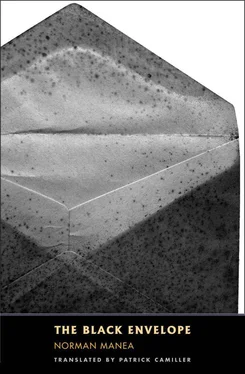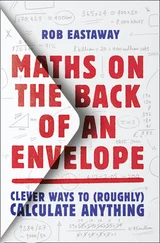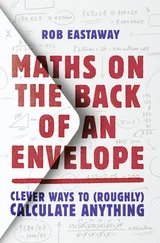“Yes, yes,” repeated the chorus with the same vibrant, fragrant, celestial cello voice. The atmosphere was fermenting, rather, or languishing. Maybe the hostess would have preferred tacit forms of communication, without all those words that complicated a chaste, domestic familiarity. Tiredness, boredom — you wonder at so much verbal fireworks. But Tolea further intensified the display: surely he will elicit the surprise interjection, a fresh impulse.
“Yes, yes, I understand,” the placid woman agreed without conviction. The slob! the aggressor-receptionist thought hysterically, exasperated by the pleasant cello voice that was nothing other than the rhythmic expiration of the slob before him.
“Yes, yes, I understand,” Venera uttered again.
They drank tea served with modest sandwiches, occasionally a little glass of plum brandy, or leisurely sips of surrogate coffee made from barley or bran, who knows. Or they would switch on television to watch the Jabberer thundering away about the happiness of the model people and threatening the enemies of the model people. Then Tolea resumed the monologue of adventures, parables, proverbs — even a hippopotamus would have burst from it all. He felt that he would soon give it up; he had already decided to give it up.
And yet he continued with the glib peroration, no longer expecting agreement except from the gloomy Tavi. It was the dog he addressed, in fact, with ever greater irritability and impatience.
He spoke looking only into the eyes of the slave protector coiled up at Venera’s feet. Tavi listened calmly, without reaction, to the constant flow of novelties, skeptically following the cement mixer as it turned out little nothings.
Perhaps it was just the silent skepticism of this witness which knocked the excited intruder off balance. He still continued to hold forth, tirelessly gesticulating and pumping out the words, but the visible boredom on the face of the lucid canine censor made him feel depressed, made him feel that he would definitely give it up soon.
Tomorrow will be the end of it! No, tomorrow is Friday, our rest day. The day after tomorrow, Saturday, the holy day — liberation. That’s it: all over on Saturday!
Saturday morning was floating in a fine mist, a gauze cloth in front of the sun. The infantilized city pampering itself, taking its time.
The professor appeared at nine o’clock, an unusual time for him. It meant he had woken up early. He was completely in white— which meant he had the day off. Perfectly shaven, as always. In his arms a huge bunch of red flowers, like a funeral wreath.
The hostess thanked him with a brief tilt of her looped hair. She took the wreath from her morning interlocutor and rested it against the hallstand, waiting for Mr. Vancea to take the bag off his shoulder as usual and hang it on the peg in front of the mirror.
The professor stood still for a moment, looking at Tavi’s stern eyes in the mirror. He smiled, gave a sketchy greeting to the hound, took the bag from his shoulder, but then changed his mind. He did not hang it up; he took it with him into the dining room.
“A wonderful day, my dear lady. What clearness, what softness, what hesitation! I couldn’t get enough of lingering in the streets, going from stop to stop. Spring drives us wild; it drives us prisoners mad.”
The tray and coffees were already there on the table. A surprise indeed. Normally Mrs. Venera started preparing things only when they were well into their conversation. Tavi was already at the feet of her chair. Venera looked splendid: the day was young, quite perfect.
“ Amantissime frater , I’d have said to him. That’s what I’d have said to the young man who was looking at me too assiduously.”
It was obvious. Tolea had prepared a completely new tactic, a novel provocation, before withdrawing from the field of battle.
“Yesterday evening I was walking alone in Carol Park. Suddenly a splendid young man! He looked like an artist. I felt him watching me for some time, as if he had followed me.”
The lady made a vague gesture of boredom. But the professor, though put out, refused to register it.
“Of course I didn’t shield myself. He had magnificent, blazing eyes. Amantissime frater —I was getting ready to call out the well-known hypnotic words, as if they were a curse. To provoke him, to scare him, to see what he’d do.”
The lady impatiently repeated the gesture of disgust. The professor did not have time to dodge it: he was dumbfounded.
“Mr. Vancea, it seems you had a beautiful sister. You don’t write to each other often, I know; you have gone your different ways. The family was opposed to the marriage, I know. And she still went off with that fanatic, I know. She has two daughters who have had other daughters. She’s a grandmother. I know all that, but it’s not the point.”
The professor had still not managed to regain his composure. Stiff, his mouth open, he was gripping between his feet the bag that had fallen beside the chair.
Venera was pale.
“Yes, the cats returned, in flames. Last night my burned cats came back to see me. The windows were burning, and my hair and—”
Venera was pale: she had wiped her brow with her hand; her hand was trembling. But she recovered, and the words and the expression on her face returned.
“Maybe you’ve been told or you remember — Sonia, the black cat who set the holy desert on fire. Tavi was in love with Sonia, your sister.”
Tavi started, majestically raising his head. But the maternal hand had already dropped in time onto his powerful, shining muzzle.
“He suffered because of her. She shook him up. She bit him— let’s not mince our words. He never got over it. He was an extremely sensitive young man, remember that, a quite special young man! Tavi wasn’t always what he later made every effort to appear, indeed to become—”
Tavi again lifted his dark eyes. But the guardian hand promptly calmed him.
“I admit, he also made some unfortunate gestures. He didn’t do them simply out of spite, though, not in a mad rage, you know. It’s simply that one move had taken away every chance he had. That Matus was certainly intelligent and lively, but such qualities weren’t enough for the fairy-tale princess, that’s what stupid Tavi thought.”
“Yes, yes, I understand,” the professor finally mumbled in a thick voice.
Mrs. Venera had pushed the tray toward the professor. Tolea automatically picked up the little cup and, with his head still reeling, bent over and sipped it. Venera in turn, having pulled back the tray, raised the little cobalt cup, sipped from it, and put it back on its saucer. Still pale, still voluble, as if spitting out the words nineteen to the dozen.
“I’m sorry you haven’t been able to meet the little tomcat. There are still signs — a kind of emotion, something uncertain.”
The professor tensely waited for her to continue, but Tavi let out a huge smothered bark that seemed on the point of shaking the house. What force the black dingo had gathered in captivity! The lady pulled her hand away from his strong, cold neck. She held it in the air for a moment, then brought its edge down on him in a brief slap. Tavi groaned as he looked in her eyes. He repeated the dull, sinister roar. The edge of her hand struck him again, quickly, three times. Calmer now, he stretched out on the floor, with his head on the guest’s bag.
“Your people still don’t seem to have given up on love. Even after all that suffering, even though others think you’re very clever. It’s not a sign of great intelligence, I have to say. Do you still want to be loved? Even though you’ve seen how much hatred you arouse? Did ancestors sing in praise of your life? Did they keep telling you that nothing is more important than life, that a creature’s life is the highest value? How could you not become hysterical if life, so short and full of misery, is all we have? At least if they’d promised you something else, a life hereafter — nirvana, or what the devil!”
Читать дальше












